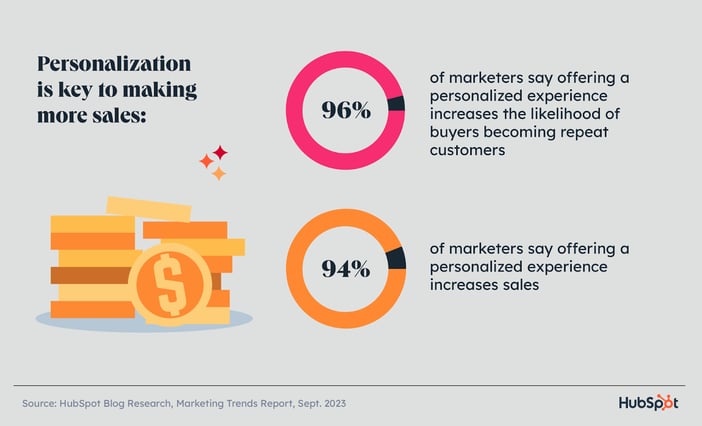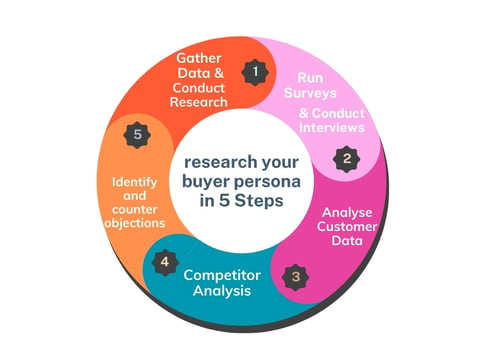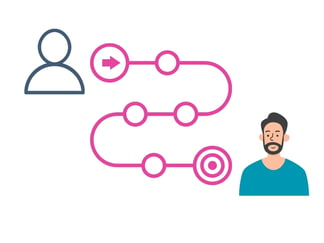Your Ideal Customer Profile (ICP) and Buyer Personas
Ideal Customer Profile (ICP) and Buyer Personas are terms often used interchangeably, but they are not the same. They are interconnected, so it's...

Why they are important for your business and checkout our examples
Along with a step-by-step guide on how to create effective buyer personas to increase your sales and marketing success
In this article
.webp?width=318&height=239&name=_buyer-persona-pink%20(1).webp)
Salespeople should adapt their approach to meet the needs of buyers with access to a wealth of online information.
Personalising the sales process is crucial to providing value and standing out. This involves understanding the buyer's role, interests, industry, common connections, and online activity.
 Salespeople need to empathise with their buyers and put themselves in their shoes. One effective way to achieve this at scale is by creating buyer personas.
Salespeople need to empathise with their buyers and put themselves in their shoes. One effective way to achieve this at scale is by creating buyer personas.
These personas guide salespeople, helping them tailor their messages to align with the prospects they engage with. By doing so, salespeople can effectively connect with their target audience and provide valuable solutions.
Buyer personas are fictional representations of your ideal customers based on market research and actual data about your existing customers. They help you understand your target audience better and make informed decisions about your sales and marketing strategies.
By creating buyer personas, you can identify your customers' needs, preferences, and pain points, allowing you to tailor your products and messaging to meet their specific requirements.
To create effective buyer personas, you must gather information about your customers' demographics, interests, behaviours, and motivations. This can be done through surveys, interviews, and customer data analysis.
By understanding buyer personas, you can develop a deeper understanding of your customers and their buying behaviours, which will ultimately help you attract and retain the right audience.
Creating buyer personas is essential for several reasons. First, it allows you to target your marketing and sales outreach efforts more effectively. Second, by understanding who your ideal customers are, you can tailor your messaging and content to resonate with them. This increases the chances of attracting the right audience and converting them into paying customers.
 Secondly, buyer personas help identify gaps in your product or service offerings. By understanding your customers' needs and pain points, you can develop products or services that address their specific challenges. This helps you stay ahead of the competition and ensures that your offerings align with what your target audience is looking for.
Secondly, buyer personas help identify gaps in your product or service offerings. By understanding your customers' needs and pain points, you can develop products or services that address their specific challenges. This helps you stay ahead of the competition and ensures that your offerings align with what your target audience is looking for.
Lastly, creating buyer personas lets you personalise your sales and marketing campaigns. By understanding your customers' preferences and motivations, you can create targeted and relevant content that speaks directly to them. This improves engagement, builds trust, and increases the likelihood of conversion.
Overall, creating buyer personas is crucial for effective sales and marketing strategies. It helps you align your efforts with your target audience, develop products that meet their needs, and create personalised experiences that drive engagement and conversion.
Selling is all about solving consumer pain points. If you can figure out what problem your product solves and who needs that solution, you can pinpoint your market with laser precision.
When you truly understand your target audience, you have the power to make niche marketing decisions that resonate on a personal level. By addressing their common pain points, your customers will feel like your company genuinely cares about them.

You may be curious about which types of businesses require the creation of buyer personas. The truth is that every business, regardless of industry, needs buyer personas. After all, every business relies on customers or clients. Buyer personas should be a fundamental part of every business strategy.
Establishing effective communication with potential customers is a primary objective of the sales team. Sales professionals rely on buyer personas to achieve this goal, as they provide valuable insights into the target audience and their pain points. By being well-prepared, sales teams can interact more effectively and achieve better results.
While it is crucial to develop buyer personas, it's also really important to target the right audience. Let's double-click on that next.
To create accurate buyer personas, it's crucial to begin by identifying your target audience. This process involves deeply understanding who your ideal customers are and what defines them.
 One effective way to identify your target audience is to analyse your existing customer data. Look closely at your most valuable and loyal customers and search for patterns and commonalities among them.
One effective way to identify your target audience is to analyse your existing customer data. Look closely at your most valuable and loyal customers and search for patterns and commonalities among them.
Consider factors such as demographics (age, gender, location), psychographics (interests, values, attitudes), and behaviours (purchasing habits, online activities).
By delving into these different aspects, you can gain valuable insights into your ideal customers and what makes them tick.
Conducting market research, which can involve various methods such as surveys, interviews, and competitor analysis, is vital for creating accurate buyer personas, in addition to analysing existing customer data.
Surveys allow you to gather information directly from your target audience by asking questions about their demographics, interests, challenges, and purchasing behaviours. Interviews allow one to delve deeper and gain qualitative insights into their needs and pain points.
Lastly, competitor analysis enables you to understand how your target audience interacts with your competitors' products or services, helping you identify gaps in the market and differentiate your offerings.
Combining these research methods can paint a comprehensive picture of your ideal customers and create accurate buyer personas. Gathering data from various sources allows you to gain a holistic understanding of your target audience, ensuring that your buyer personas truly reflect their characteristics and preferences.
Remember, identifying your target audience and creating buyer personas is not a one-time task. It is an ongoing effort that requires continuous data collection, analysis, and refinement. By staying updated with your audience's changing needs and behaviours, you can ensure that your buyer personas remain accurate and effective as your business evolves.
Once you've identified your target audience, it's time to start gathering data and conducting research to create effective buyer personas. This step is crucial for gaining a deeper understanding of your customers and customising your marketing strategies to meet their needs.
Surveys are one of the most effective ways to gather data. Using surveys, you can directly ask your customers about their demographics, interests, challenges, and purchasing behaviours. Asking the right questions will provide valuable insights into their preferences and motivations. It's important to design surveys that encourage honest and detailed responses to ensure the accuracy of the information you receive.
In addition to surveys, conducting customer interviews can provide even deeper insights. These qualitative interviews allow you to go beyond surface-level information and understand the emotions and motivations driving your customers' purchasing decisions.
Engaging in one-on-one conversations enables you to uncover pain points and challenges that may not have been captured in survey responses. Delve deeper into what exactly it is that your customers and prospects like about your products and services.
Be flexible in your approach. These interviews can be conducted in person, over the phone, or through video calls, whichever is more convenient.
Don't overlook valuable information that resides with your sales team
Consider the valuable insights your sales team provides regarding the leads and customers they frequently engage with. What key observations can you make about the various customer segments that your business serves exceptionally well?
Analysing your existing customer data is also crucial in creating accurate buyer personas. Look for patterns and trends among your best customers, such as demographics, behaviours, and preferences. This data will help you create detailed and realistic buyer personas that represent your target audience. Understanding what your most valuable customers have in common will provide better insights into the characteristics and preferences of your ideal customers.
Lastly, conducting competitor analysis is important in developing effective buyer personas. By understanding how your target audience interacts with your competitors' products or services, you can identify gaps in the market and differentiate your offerings. This analysis can involve studying your competitors' marketing strategies, analysing customer reviews and feedback, and monitoring social media conversations. Understanding what your competitors excel at and where they fall short will allow you to position your products or services in a way that appeals to your target audience.
A trigger inspires your potential customers to seek out your company. Understanding what motivates them to find a solution can significantly enhance your sales pitch.
Understanding the motivations and mindsets behind your customers' actions is crucial for building better relationships. By outlining triggers when creating your buyer persona, you can gain insights into the various motivational factors that may vary from customer to customer, such as a lack of revenue or an ineffective system. Additionally, it's important for sales representatives to uncover the common objections among your customer base. This knowledge allows your sales team to address potential objections proactively and tailor their messages to resonate with prospects.
If a customer has shared a specific concern, prospects in a similar industry are likely to have similar questions. By preparing a buyer persona, your sales team can tailor their content to address these concerns proactively, making your product even more valuable.
In summary, gathering data and conducting research are vital for creating effective buyer personas. Surveys, interviews, analysing existing customer data, and conducting competitor analysis, along with knowledge of common customer objections, are all valuable inputs to gaining insights into your target audience.
By gaining a deeper understanding of your customers, you can tailor your sales strategies to reach and engage them effectively.
Now that you have all the data you need to develop effective buyer personas, it's important to consolidate all the data and insights you've gathered. It's time to leverage your research to uncover patterns and similarities among the responses to your interview questions and create detailed profiles of your ideal customers.
 From there, you can create a primary persona and share it with your entire team, allowing everyone to understand better and connect with your target audience. This step is crucial in developing effective buyer personas and ensuring that your outreach efforts are tailored to reach the right audience..
From there, you can create a primary persona and share it with your entire team, allowing everyone to understand better and connect with your target audience. This step is crucial in developing effective buyer personas and ensuring that your outreach efforts are tailored to reach the right audience..
This process will help you better understand and connect with your target audience. Hubspot offers a free template, "Make My Persona," to help you start creating buyer personas.
Start by giving each persona a friendly name and a brief description that captures their key characteristics. This makes them more relatable and helps you and your team remember and refer to them easily. For example, you might have a persona named "Marketing Molly" or "Latest-tech Larry."
Once you've named your personas, it's time to outline their demographics. This includes age, gender, location, occupation, and income level. Understanding these factors allows you to tailor your sales and marketing efforts to reach the right audience.
Next, dive deeper into your personas' interests, values, and attitudes. Consider their hobbies, preferences, and lifestyle choices. For instance, you might find that Larry is interested in the latest technology trends and values convenience and efficiency in his purchasing decisions. On the other hand, Molly might be interested in Account Based Marketing trends and automated marketing systems.
 Identifying pain points and challenges is another crucial aspect of developing buyer personas. What problems are your personas trying to solve, and how can your product or service help them overcome these obstacles? Understanding their pain points will enable you to tailor your messaging and positioning to address their needs.
Identifying pain points and challenges is another crucial aspect of developing buyer personas. What problems are your personas trying to solve, and how can your product or service help them overcome these obstacles? Understanding their pain points will enable you to tailor your messaging and positioning to address their needs.
For example, Larry might struggle with keeping up with the latest technology advancements and might appreciate a product that simplifies his life.
Molly, on the other hand, might face challenges in finding a Customer Support tool that is easy to use and has high adoption rates among her team. She could benefit from a platform that offers automatic ticket creation and is known for being user-friendly.
Furthermore, buyer personas serve as a guiding light for your business, showing you the path to effectively assist potential customers. These personas provide invaluable insights into the type of content you should create, the material you should share, and how to direct your sales and marketing efforts. Without them, you would be lost in a sea of uncertainty, unsure of where to focus your efforts or how to improve your online presence. They are the essence of your narrative, the framework supporting all your endeavours. Consider them the compass that points you in the right direction, ensuring your journey leads to success.
Lastly, crafting compelling narratives for each persona is a potent tool to breathe life into them. Detail their ambitions, aspirations, and how your product or service can propel them towards success. Seamlessly weave their pain points and challenges into their stories, making them relatable and showcasing how your offerings can make a difference in their lives.
These narratives will guide your marketing strategies, enabling you to create content that deeply resonates with your target audience. For example, you could craft a story for Larry, illustrating how your tech product will revolutionise his organisation and save him precious time.
Alternatively, you could create a narrative for Molly, highlighting how your ticket automation platform makes managing tickets from the installed base so much easier while keeping on top of all her other service tasks.
The ultimate goal of creating buyer personas is to precisely identify and attract the right audience, delight them with compelling content and insightful information, and ultimately convert them into loyal customers who fully embrace your business products and services.
Moreover, creating specific, concise buyer personas allows you to effectively segment your audience and contacts and deliver precisely targeted messaging. In a business landscape saturated with information, it is crucial to be specific and detail-oriented. The more personalised and accurate you can make your content, the easier it becomes to cut through the noise and engage with your target audience.
Remember, developing effective buyer personas requires continuous refinement and updating as you gather new data and insights. By regularly revisiting and refining your personas, you can ensure that your sales and marketing efforts remain targeted and relevant, ultimately helping you attract and retain the right audience for your business.
To effectively target and engage decision-makers encountered by your sales team, your company needs to develop a B2B buyer persona for each individual decision-maker your sales folk interact with.
Gartner found that there are generally 6 to 10 decision-makers in the B2B buyer journey, but this number can vary based on your industry.
You'll likely need a persona for each of these people in the buying process:
To maximise the effectiveness of your sales conversations throughout the buying process, it is crucial for your sales team to have personalised sales material and for your sales and marketing strategies to address each decision-maker involved.
Remember that these personas should be based on the individuals your team interacts with during the sales process, rather than relying on assumptions or guesswork. You can create buyer personas that drive results by utilising real data.
Now that you have one or more well-defined buyer personas, it's time to leverage them to enhance the effectiveness of your sales team.
The sales enablement team plays a crucial role in driving this effort as they have connections with various departments. They can ensure that everyone uses the same language when communicating with specific audience segments. This consistency in messaging ensures that your prospects have a unified and seamless experience, regardless of whom they interact with.
By utilising buyer personas, your sales team can better understand the needs, preferences, and pain points of each segment of your target audience. This knowledge allows them to tailor their sales approach and messaging to engage and convert potential customers effectively. With the help of buyer personas, your sales team can create personalised sales materials that resonate with each decision-maker involved in the buying process. Aligning your content with your buyer persona will help you align your customers' challenges with your solutions.
Ultimately, by using buyer personas, your sales team can provide a more customised and impactful experience for your prospects, increasing the likelihood of closing sales and driving business growth.
Buyer personas are a standout strategy because they are grounded in real customer data. They go beyond theory and represent your ideal audience. Using buyer personas gives your sales team a powerful advantage, being able to leverage buyer personas can greatly enhance your sales results and create a unified messaging approach across sales, marketing, and customer service.
By understanding each audience segment's needs, preferences, and pain points, your sales team can tailor their approach and messaging to engage and convert potential customers effectively. With the help of buyer personas, personalised sales materials can be created to resonate with each decision-maker involved in the buying process. This personalised and impactful experience increases the likelihood of closing sales and driving business growth.
How to create and edit personas in HubSpot
Get your free HubSpot Buyer Person Template here - make my persona
When it comes to optimising products and services, businesses need to consider four main types of personas.
By considering these different persona types, businesses can gain a comprehensive understanding of their target audience and tailor their strategies to reach and engage them effectively.
Successful companies utilise their buyer personas not only for content development but also for various other purposes. Here are the top seven strategies that high-performing companies adopt when leveraging their buyer personas.
The more you understand your prospects and customers, the better you can provide solutions that truly matter to them. By sharing your buyer personas with your product development teams, you can significantly impact your organisation.
When your team knows the challenges and obstacles that are keeping your clients up at night or holding them back, they can put their minds together to develop products and services that address their needs. This eliminates most of the guesswork from the process.
Furthermore, they can use personas to improve or modify existing products as they gain insights into how and why your personas are using them.
When onboarding new sales reps, it's crucial to share your buyer personas with them. These personas will guide their conversations and interactions with prospects, influencing how they approach each situation. By having a clear understanding of their prospects from the start, they can set themselves up for long-term success. If you haven't already, be sure to incorporate buyer personas into your training process.
Buyer personas can be a valuable tool for your new sales team to understand the best approach to take with prospects and how to effectively manage the entire process. By using personas, a sense of clarity is created so that when salespeople are developing their strategy and reviewing it with managers or colleagues, everyone is on the same page and speaking the same language. This ultimately leads to greater success and faster results for your team.
As mentioned earlier, buyer personas have a significant impact on content creation. They should serve as a guide for determining your blog topics. Your website content should be tailored to them, ensuring that every piece of content, including videos, podcasts, case studies, and landing pages, reflects the characteristics of your buyer personas.
And let's not forget the importance of graphics as images are a key part of content development, yet they are often overlooked when it comes to sharing buyer personas. Remember graphics play a vital role in creating effective content.
Having a deep understanding of your buyer personas is crucial for crafting content that truly resonates with your target audience. Buyer personas go beyond just language selection; they help you determine the most effective approach to your messaging.
Having well-defined buyer personas enables you to craft a message that incorporates all the necessary elements for a memorable and actionable message. By understanding what is important to your prospects, the challenges they are encountering, and their roles in the buying process, you can shape your message to be effective and resonate with them.
Customer service and support reps have the unique advantage of directly contacting customers. Their role is to assist customers in resolving any issues they may encounter while using your products and services. They have the opportunity to listen to customers firsthand, understanding their frustrations and what they love.
By having a clear understanding of your organisation's buyer personas, customer service and support reps can further enhance their interactions with customers. By knowing who the customers are, what led them to make a purchase, and their concerns and goals, they can tailor their conversations to better meet the needs of each customer.
Providing exceptional after-purchase support is essential in building customer loyalty and generating referrals. That's why it's important to integrate buyer personas into your training process, empowering your customer service and technical support reps to deliver personalised and effective assistance and ensuring an outstanding Customer Experience.
When building processes throughout your company, it's crucial to consider how each part will impact the people involved, including your customers and prospects. By having complete buyer personas, you can proactively identify and address potential issues before they become problems.
Just like product development can use buyer personas to guide their efforts, CEOs, COOs, and CFOs can also benefit from them when creating the overall strategy for their organisation.
Of course, customers should always be the primary focus of any organisation. Revenue is the positive outcome that results from providing products and services that truly impact the lives of a group of people – your buyer personas.
As business leaders work to create strategies that will lead to sustained and profitable revenue growth, it's important to begin by understanding your buyers.
Executives at companies that consistently exceed their goals use buyer personas to direct and manage their companies. They understand the value of keeping the buyer personas updated as market conditions, technologies, and regulations change. Some may even assign internal resources and a budget to the buyer persona effort.
By ensuring they have up-to-date information on their buyers, executives can make better-informed decisions that align with their growth objectives.
Buyer personas are not only a critical part of successful content development, but they can also have an impact on other areas of your organisation. By incorporating buyer personas throughout your company, you'll find yourself among the group that exceeds expectations.
If you're seeking expert guidance to develop buyer personas for your sales team, look no further. We offer a custom workshop sure to deliver all you need to know about creating and using your buyer's personas.
Our buyer persona workshops are designed to immerse your team in a full day of creating and documenting detailed buyer personas for your business.
If this is of interest, why not get in touch with one of our team to find out more?
Considering HubSpot Sales Hub for your team? We have a ton of information curated for Sales Hub folk, check it out for a comprehensive overview of what's included, demo video, FAQ and case studies and much more Sales Hub related content.
Sales Consulting Services are a valuable resource for businesses looking to grow revenue, boost their sales and maximise profits. Skilled sales professionals with market expertise and strategic know-how collaborate closely with your team to evaluate your current status, pinpoint areas for enhancement, and offer tailored strategies for sales growth.
From Big Deal Reviews, Lead Generation Campaigns, Go To Market Strategy, defining Ideal Customer Profile, Pricing and Packaging review and Sales Process audit, we guide you on what to do and how to do it.
Schedule a complimentary 30-minute consultation to find out how we can help you.
Why not join us at SpokeSpeak? - a Sales and HubSpot focussed community that's open to HubSpot enthusiasts, experts and newbies as well as those of you who are simply Hub-curious 🤔
Check out the next episode at SpokeSpeak.com
Why align your sales process with the buyer's journey?
Top 5 Strategies for Lead Generation on LinkedIn
Discover the Power of Personalisation in your Sales Emails

Ideal Customer Profile (ICP) and Buyer Personas are terms often used interchangeably, but they are not the same. They are interconnected, so it's...

Why consider aligning your Sales Process with the Buyer's Journey? Buyers and sellers may seem like they're from different planets. On one side,...

Aligning your sales pipeline with a sales view of your buyer's journey is a smart move. Seriously, it's a no-brainer. Especially for B2B Sales...